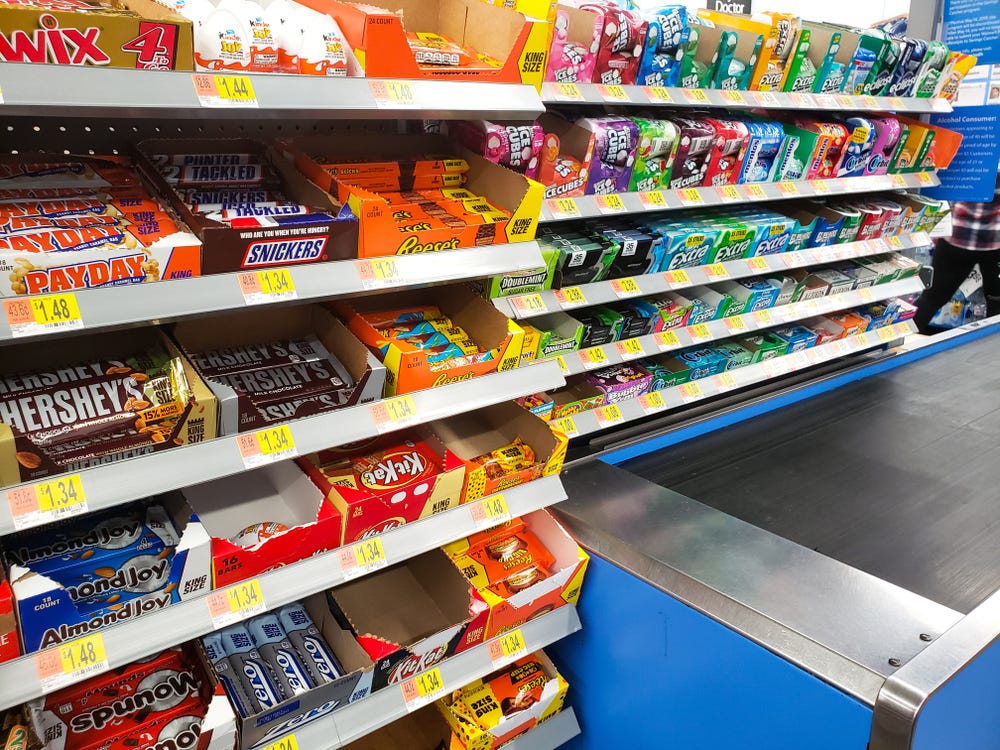70% of food and drinks from check-out lines are unhealthy, study finds
Navigating the checkout lane in search of healthy options could be a challenge, according to researchers at the University of California

[July 6, 2023: Karen Nikos, University of California - Davis]
Navigating the checkout lane in search of healthy options could be a challenge, according to researchers at UC Davis. (CREDIT: Creative Commons)
We’ve all been there: waiting in line at a store checkout, surrounded by tempting snacks and drinks. Navigating the checkout lane in search of healthy options could be a challenge, according to researchers at the University of California, Davis, who found that 70% of foods and beverages at checkout are unhealthy.
For snack-sized options, an even higher proportion were unhealthy — 89%.
A study published this month in the journal Current Developments in Nutrition suggests most food and beverage options at checkout consist of candy (31%), sugar-sweetened beverages (11%), salty snacks (9%) and sweets (6%).
Healthy items were far less common. Water represented 3% of food and beverage options, followed by nuts and seeds (2%), fruits and vegetables (1%), legumes (0.1%) and milk (0.02%).
Related Stories:
Food and beverage companies consider the checkout lane to be prime real estate for their products, said Jennifer Falbe, associate professor with the Department of Human Ecology and lead author of the study. The checkout is the only place in a store where every customer must pass through, and it’s known to contribute to impulse purchases, she said.
“The checkout lane has been designed this way through marketing agreements in which food and beverage companies pay stores to place their products — which are mostly unhealthy — at checkout,” Falbe said.
Researchers analyzed the checkout lanes in 102 food stores in Davis, Sacramento, Oakland and Berkeley. Stores included supermarkets, grocery stores, specialty food stores, drugstores, dollar stores and mass merchandisers.
Type and location of stores sampled for observational assessment of checkouts. (CREDIT: ScienceDirect)
The evaluation was conducted in February 2021, right before an ordinance in the city of Berkeley went into effect requiring large food stores to offer more nutritious offerings at the checkout. Berkeley became the first city in the U.S. to implement a healthy checkout policy.
Falbe said Berkeley’s policy is consistent with federal dietary guidelines that emphasize consuming nutrient-dense foods such as fruits, vegetables, whole grains, nuts and seeds and cutting back on sodium and added sugars.
“The majority of the U.S. population exceeds the daily recommended limits for added-sugar and sodium intake,” Falbe said. “Berkeley’s checkout policy allows certain food and beverage categories at checkout (e.g., unsweetened beverages, fruits, vegetables, nuts, seeds, legumes and dairy) and sets limits on the amount of added sugar and sodium in a product at checkout. Shoppers can still get candy from the candy aisle, but it won’t be forced on them at checkout.”
Researchers found that markets place unhealthy food and drinks at checkout lines to entice customers to buy them. (CREDIT: Creative Commons)
In the study, Berkeley’s policy was used as a benchmark to help measure the healthfulness of products at store checkouts. The researchers found that the percentage of food and beverage options that met healthy checkout standards was highest in chain specialty food stores, chain supermarkets and chain mass merchandisers. It was lowest in chain dollar stores and independent grocery stores, which are more common in disadvantaged neighborhoods.
Checkout areas can strongly influence consumer choices. Falbe said she hopes that these findings can be used to help improve the food environment for people across all neighborhoods.
“There’s an opportunity here for checkouts to offer more choice by expanding access to healthier options,” Falbe said. “Currently, consumers lack choices at the checkout.”
The study’s contributing authors include Ethan Wolf and Sarah Solar with UC Davis Department of Human Ecology, and researchers with the University of Illinois, Chicago.
The study was funded by Bloomberg Philanthropies’ Food Policy Program.
Falbe was also supported by a career development award from the National Institutes of Health’s National Institute of Diabetes and Digestive and Kidney Diseases.
Note: Materials provided by University of California - Davis. Content may be edited for style and length.
Like these kind of feel good stories? Get the Brighter Side of News' newsletter.



